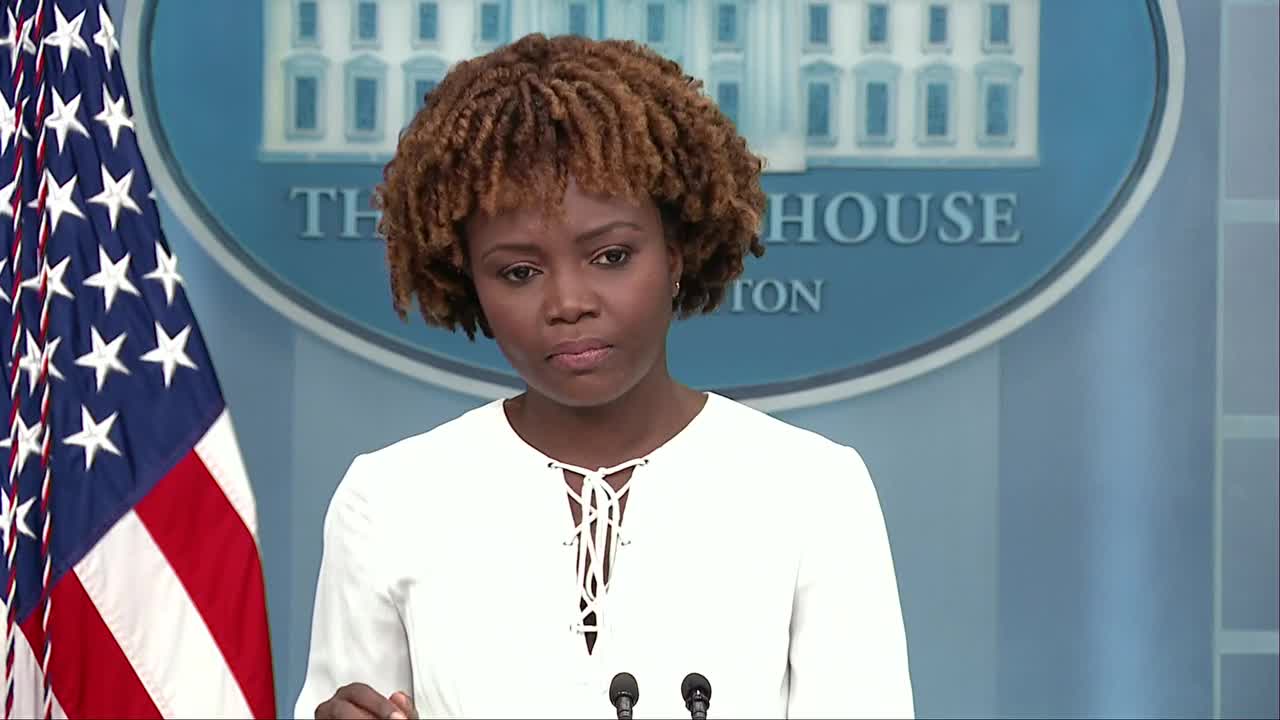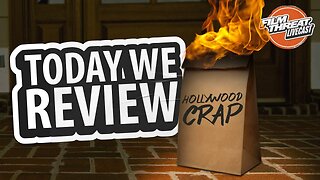Premium Only Content

Press Briefing by Press Secretary Karine Jean-Pierre, September 8, 2022
MS. JEAN-PIERRE: Good afternoon, everybody. Okay.
The Queen has been — the — I’m so sorry. Good afternoon, everybody. It’s been a long morning.
All right, let’s do this again. The President has been briefed and will be updated throughout the day on the concerning news out of the United Kingdom about Queen Elizabeth’s health. His and the First Lady’s thoughts are with the Queen and her family today.
The President also conveyed to Prime Minister Truss during a previously scheduled video conference this morning that he and Dr. Biden are thinking of the Queen, her family, and the people of the United Kingdom.
This morning, the President hosted the video conference with allies and partners to underscore international support for Ukraine, including through continued security and economic assistance, and the sustained imposition of costs on Russia to hold the Kremlin accountable for its aggression.
They discussed Russia’s weaponization of energy and additional steps to secure sustainable, affordable energy supplies for Europe. They committed to continued close consultation on this issue.
In a few — in a few — in about an hour or so, the President will give remarks on the new, updated COVID-19 vaccines with a simple, clear message: “Don’t wait. Get a COVID shot this fall.”
He’ll note that with these new, updated vaccines, we’re entering a new moment in our fight against COVID. For most Americans who are fully vaccinated, our nation’s health experts are recommending that you get the updated COVID vaccine once a year.
The President will also discuss our plan to ensure Americans get these new vaccines and are preparing for the fall and winter.
First, by making these vaccines available for free and easy to get at tens of thousands of convenient locations.
Second, we’re also doing our part by taking action. While we’re constrained in what we can do with our limited remaining COVID re- — response funding, we’re acting to further increase access to tests and treatments, including by purchasing some more tests and launching a new pilot program to further expand testing.
Third, the President will call on everyone to do their part, with specific calls to action for schools and businesses.
Last, the President will continue to call on Congress to take — to take action on the administration’s request for additional COVID-19 funding so we can make important investments to support testing, long-COVID research, and the development of next-generation vaccines and research.
So, here’s the bottom line: The President will underscore that we’ve come a long way in the last 19 months. People are back to work, kids are back in school, and we can now prevent the most serious outcomes from COVID. And if we all stay vigilant and keep doing our part, we can build on this progress and keep people safe, manage COVID, and minimize disruptions this fall and winter.
Lastly, tomorrow, President Biden will travel to Licking County, Ohio, to deliver remarks at the groundbreaking of Intel’s new $20 billion semiconductor manufacturing facility.
Intel committed this funding in anticipation of the passage of the bipartisan CHIPS and Science Act. The facility will be built by union labor, creating over 7,000 construction jobs and 3,000 full-time, producing, leading-edge CHIPS jobs as well.
Thanks to the President’s economic plan, U.S. manufacturing is back. Our economy has already added more than 680,000 manufacturing jobs since President Biden took office, which is more manufacturing jobs on average per month than any other President in the last 50 years.
Just in the last few weeks, Micron announced it will invest fifty — $15 billion in a new memory chip manufacturing facility in Boise, Idaho, creating 17,000 jobs.
GlobalFoundries and Qualcomm are partnering to invest $4.2 billion to manufacture chips in an upstate New York facility.
Major global companies like Toyota and Honda are choosing America as the place to invest and build.
When we make more in America, we strengthen our supply chains, bolster our economic and national security, and lower costs for Americans.
The CHIPS and Science Act is a once-in-a-generation law that invests in America itself, and it’s a law that American people should be proud of.
With that, go ahead, Aamer. Good to see you.
Q Good to see you, too. Does the White House support putting Senator Manchin’s permitting reform measure in the continuing resolution needed to fund the government?
MS. JEAN-PIERRE: Say — say that one more time.
Q Sure. Does the White House support putting Senator Manchin’s permitting reform measure into the CR?
MS. JEAN-PIERRE: So, we support the permitting reform bill, which will help us realize the benefits of the historic investments in the Inflation Reduction Act and the Bipartisan Infrastruc- — Infrastructure Law as well. We want to see it enacted. We are working with Senator Schumer and Senator Manchin to find the best path forward.
We think it’s important to meet the country’s clean energy goals and to reduce cost and to promote energy security. Permitting always delays a new solar and new wind projects are among the longest in our — in our country.
So, right now, as you all know, we’ve seen gas prices moving downward at a record pace in — fastest pace in history — in our history. The point of this legislation is to help ensure a long-term clean energy supply for this country. And — and so, we’re going to continue to work with Senator Schumer on this.
Q With the permitting reform, the White House believes it could have an effect on a downward trend with gas prices?
MS. JEAN-PIERRE: So, again, you know, we’ve done the work to see the prices of gas at the pump go down every day this summer — consecutive days, 86 days. It’s at three hu- — $3.75 per gallon nationally. And so, we’ve done the work to do that.
What we see this will help us do is ensure long-term clean energy supply for this country. And so, this is — this is a reason why we think this is important.
Q And just lastly on that: Is there any concern –there’s obviously differences amongst Democrats on this — that this could sink a CR and lead to a government shutdown?
MS. JEAN-PIERRE: Meaning this particular —
Q Yeah, this issue.
MS. JEAN-PIERRE: Look, the way that we see this is this is not the first time that we’re going through a process — a CR process. We did it last year. And we believe that it can happen again, that Congress can move forward and get the CR done.
Q Thank you. You’ve been referring to this new shot as the “updated COVID-19 vaccine.” Can you explain a little bit more the decision to no longer be calling it just a booster?
MS. JEAN-PIERRE: Well, we — we have to remember we haven’t seen a vaccine — a new vaccine since December 2020. Our health and medical experts made an independent determination that we now have new, updated vaccine, as you just said, to fight COVID. It is the first time that we have seen this type of updated vaccine, like I said, since December of 2020.
And if you — and the message to folks that we are — we’re — we are providing is: If you’re 12 or older and it’s been at least two months since you last got a shot, you should get these new updated vaccines right away. That’s the doctor’s advice. And they made this decision independently.
Q But you do still need to get the first original dose before you can get this shot. The FDA, the CDC — they’re still referring to this as a booster. So, I guess, why the discrepancy? Are you concerned that may cause some confusion?
MS. JEAN-PIERRE: Well, I’m not going to get into, like, regulatory language on what to call this. I’ll leave that to a booster or a vaccine. We’ll just lay — I’m just laying out what the doctors and the experts have recommended.
This is, again, a new vaccine. We haven’t seen a new vaccine since December of 2020. What this vaccine does — it targets the Omicron variant, which is the dominant variant not just here, but globally. And this is — this is good news. This is a step forward. And we’re going hear more from the President about this.
But we think this is, again, a good step forward. We are in a place where COVID is now manageable. We know what works. We know what keeps us safe, what keeps us from not getting sick — is by getting vaccinated.
And right now, if you think about it, there’s more than 200 million Americans who are currently fully vaccinated. That’s 77 percent of the population who are 12 and older. And so, that’s — that’s an important way forward that the President has worked very hard since stepping into the administration to make sure that we had a comprehensive vaccine, you know, getting shots into arms operation. And this is part of that.
Q And just a logistical question. You mentioned the President being briefed on the Queen’s health. If she were to pass, should we expect the President would travel to any service?
MS. JEAN-PIERRE: Well, we think it’s inappropriate to actually be talking about that at this time, so I don’t have anything to share on travel.
Again, you know, as I stated, the people of UK and the family — the Queen’s family are in the hearts of the President and Dr. Biden. So, I’ll leave it there.
Q Thank you, Karine. Has the White House specifically inquired about the Queen’s health this morning? And when was the last time President Biden actually spoke to the Queen? Was it at the G7 in Cornwall, or have they had conversations after that?
MS. JEAN-PIERRE: So they — they last met during the President’s visit to the United Kingdom in June 2021 in Cornwall, as you just stated, when she welcomed the President and the First Lady to Windsor Castle.
A few days before that, she also hosted the President and another G7 leaders at a reception in Cornwall, which is what — which is what you just stated.
Yeah. That was the last time that they saw each other.
Q And has the White House specifically inquired about her health, or has —
MS. JEAN-PIERRE: I can tell you that the President has been briefed. I don’t have any calls to preview at this time. But he has been briefed on the situation.
Q And a quick one on the tech meeting. We saw the readout that landed a few minutes ago. The White House held a listening session with senior administration officials on the harms caused by big tech. And we are sort of just trying to understand, you know, why tech companies were not invited to participate in such a session and, you know, why did you decide to have such a meeting now.
MS. JEAN-PIERRE: So, look, this is, as you know, the largest tech meeting — convening that we have had at the White House since the be- — since we have started in the last 19 months.
These — just a couple of things I want to say about this, because it’s really important. These principles are the culmination of months of work by the administration and engagement with numerous stakeholders. They also consist with work that the administration has been doing and will continue to do.
So this is an important roundtable, as you’ve heard from the readout and as we’ve laid out. Look, we are — you know, we’re looking forward to hearing any feedback from the tech companies. And I’ll just leave it at that.
Q Any plans to specifically act on the recommendations that came out? I mean, there were —
MS. JEAN-PIERRE: I don’t have anything — I don’t have anything specific to add. Look, again, the roundtable is the largest discussion about the harms of tech companies, as you just started in your question, held at the White House. The President has long called for fundamental legislative reforms to address these issues, and we look forward to continuing that work with Congress to make bipartisan progress on these issues.
Again, the President also encourages federal agencies to use the tools they have to continue advancing these principles throughout their work, as well. And we welcome any — any feedback from the tech companies.
Q When the President conveyed his thoughts to Prime Minister Truss, did she offer any update on the Queen’s condition or the Queen’s health, based on what she knows?
MS. JEAN-PIERRE: I don’t have anything more to share from — from what I just stated about him having a conversation or speaking to her briefly during this call this morning.
Q Did the President express any concerns over the Queen’s health after meeting with her, as he did last summer?
MS. JEAN-PIERRE: Concerns meaning —
Q Concerns about her health and how she was doing.
MS. JEAN-PIERRE: That is not information that I have.
Look, you know, I’ll just reiterate this because I think this is important, which is our countries and people have always had a — or shared a special relationship. And our thoughts are – again, are with the people of the United Kingdom, with the Queen and her family. And she, again, as the President has stated — you know, they are in the hearts of both the President and Dr. Biden.
I don’t have more to share on that.
Q Thank you.
Q Do you have any update on when the last time the President has spoken to the Queen? Was that when they met, as Kaitlan just referenced?
MS. JEAN-PIERRE: Yep.
Q Or have they —
MS. JEAN-PIERRE: It was when they met in June of 2021, is the last time they spoke and saw each other.
Q And then, just on COVID, there’s a projection that the administration could run out of tests in another — if there’s another major COVID wave. I’m wondering if there’s any updates on whether or not the White House or the administration plans to buy more tests.
MS. JEAN-PIERRE: I mean, we’ve been very clear we need Congress to pass the CR. We have made some cuts here and there to the — to our fall plan and — and in order to move forward with this COVID vaccine that we’re talking about, that the President is going to announce today. We — we have enough for the fall but not for the winter.
And we have been very clear that in order to — to not — to not be left behind, to continue moving in our progress, we need Congress to fund the COVID — you know, the COVID response funds that we have asked for — the $22 billion.
So we’re going to continue to work with Congress. We’re going to continue to have those conversations — those bipartisan conversations to move that — that conversation forward on getting that CR done.
And so that is a priority for this administration. We’ve been talking about that for months now. There’s nothing new there. And in order to continue with the testing, in order to continue with these new vaccines that are very important, that is a gamechanger in how we’re approaching managing COVID, we need those funds.
Q Logistically, would the President be given any sort of heads up if the Queen does pass? Or would he find out, kind of, when Buckingham Palace releases a statement?
MS. JEAN-PIERRE: Again, I mean, we just feel — we just feel having those conversations at that time is inappropriate. Clearly, if anything is to share, we will share that. But again, we’re thinking about their family. They’re in our hearts. And just not going to get ahead of that at this time.
Q And then, on the President’s call with allies, in the readout they mentioned that they talked about Russia’s weaponization of energy and the need to, you know, coordinate on sustainable and affordable energy. Is the President concerned that gas prices — you mentioned that they’re coming down. Is he concerned about them increasing again?
MS. JEAN-PIERRE: In — here in the U.S.? I mean, the President is doing everything that he can to make sure that we lower the costs for the American people. This has been a priority for him. And he took really bold actions to see the trend that we have seen — been seeing with gas prices, right? Eighty-six days they’ve been trending down. And so we’re encouraged by that.
It’s been — it’s been — it’s been, you know, work that, again, his leadership from the Strategic Petroleum and making sure that we tap those — that historic tapping of the Strategic Petroleum of 1 million a day for — for the last several months, that has helped. It’s the ethanol 15 that he made a decision on to make that available during the summer, which is not a regular time to make that available.
He took bold actions, and now we’re seeing — we’re seeing that effect.
So, look, we’re going to continue to take — to look at all options. We’re going to continue to make sure we keep costs down for — for the American people, including at the pump.
Q And then you mentioned the President is going to Ohio tomorrow for this groundbreaking. Is this going to be something that we’re going to see throughout the midterms — going to these kinds of ribbon-cutting ceremonies, groundbreakings? I mean, is that kind of the focus?
MS. JEAN-PIERRE: So, look, I can’t talk about the midterms from here. I can’t talk anything political from — from where I stand and in this position.
We put out a memo in August laying out what — what the next several weeks would look like. We had a string of successes, as you know: the Inflation Reduction Act, which is going to lower cost for Americans as it — as it relates to healthcare, as it relates to making sure prescription drugs are lowered for our seniors, as it relates to investment in dealing with our climate crisis, which is all incredibly important. CHIPS Act — as you know, that’s what he’s going to be focusing on tomorrow.
And so we’re going to go out there. We’re going to have those conversations with the American people. Not just us — Cabinet Secretaries; you’re going to see congressional members out there, Democrats who — who are going to make sure that the American people know the work that this President and Democrats have done in Congress on behalf of the American people.
And so we’re going to do that these next several weeks. The President is going to go to Ohio. He’s going to go to other states in the next couple of weeks. And this is important. This is important because as we talk about the gas prices, the President has been very clear with his — one of his priorities as it comes to the economy, as it relates to the economy is to lower costs for the American people. And so we’re going to have those conversations across the country.
Go ahead.
Q Does the President have any intention to go to the British Embassy to sign any book today, though she’s — since we know that she’s ill, to express his best wishes to the people of that country?
MS. JEAN-PIERRE: I don’t — I don’t have any changes to his — his schedule to announce.
Q Is that under consideration?
MS. JEAN-PIERRE: Nothing — nothing to — to — on his schedule today that’s changed at this time that I have to report from here.
Q Understood.
Let me ask you about an announcement that was made by another news outlet this week. It relates to what the Republicans are calling the “Commitment to America.” Axios reporting that Kevin McCarthy is going to unveil this economic agenda later this month in Pittsburgh. Among the items it dictates is a desire to put an end to Build Back Better. Presumably, that refers to the Inflation Reduction Act.
What’s the President’s view on that, given it’s being celebrated by Democrats as his — one of his signature achievements?
MS. JEAN-PIERRE: Look, it says everything that one of the first acts that Kevin McCarthy does — his first act when it deals with the economy and dealing with how do we make — give a little breathing room to the American people is wanting to get rid of the Inflation Reduction Act, which we know — which we know the Inflation Reduction Act is going to help lower costs for our seniors.
It is a — it is a big win for the American people when you think about beating Big Pharma, something that Democrats and congressional members have been trying to do for decades, beating a special interest group that has spent hundreds of millions of dollars trying to make sure that we do not do that — lower cost for our seniors — and also make a real effort in energy costs and climate change — lowering those costs as well.
So the fact that that’s the thing, that’s what Kevin McCarthy wants to do, that tells you everything that you know — that we need to know: that they are all for tax giveaways. And — and it’s a clear, clear message that they are sending to the American people.
Let’s not forget: Medicare is popular with the American people. What we’re trying to do is popular with the American people. Protecting Social Security, which is something they have put on the chopping — chopping blocks as well, that is very popular with the American people.
So I think it says — it says all that we need to know about Kevin McCarthy’s agenda and how it does not stand for the American people.
Q Last question, very quickly: President Obama, in his last visit to the White House, turned to reporters and delivered his message to Democrats on what he thought they needed to do ahead of the midterms. There were no comments from him publicly to the reporters that were in the room.
What did he tell the President yesterday about what he thinks needs to be done for Democrats, given this uphill climb they still face even though the polls show it’s an increasingly close midterm ahead? What did he say to the President that needs to be done to help sort of turn that tide?
MS. JEAN-PIERRE: So, again, I can’t talk about the midterms or any political election from this podium —
Q About achievements. We don’t have to talk about the midterms. What did he say he needs to do better?
MS. JEAN-PIERRE: And what I can say is what I reiterated earlier to one of your colleagues, which is: We are going to talk about the successes that we have been able to do in the last 19 months for the American people. And that is building an economy that works for all, doesn’t leave anybody behind; make sure that we build an economy from the bottom up and the middle out.
That’s what you’ve seen with the Bipartisan Infrastructure Law. That’s what you’ve seen with the American Rescue Plan. That’s what you’ve seen with the CHIPS Act — CHIPS Act — CHIPS and Science Act.
That’s what you see with — again, with the work that this administration, along with Congress — Democrats in Congress have been able to do.
We have a lot of things that we can talk about directly with the American people. And that’s what we’re going to do.
The President is going to go to Ohio. They’re going to — we’re going to go to Intel. Intel made this investment in manufacturing jobs investment because of the CHIPS and Science Act, because of the commitment that we’re making to manufacturing jobs.
Q Thank you.
MS. JEAN-PIERRE: And so that’s going to continue to be our focus.
Go ahead.
Q Yes, on the Queen’s condition, who is briefing the White House about how she’s doing? Are you hearing from the Prime Minister? Are you hearing from Buckingham Palace? How are you getting your information?
MS. JEAN-PIERRE: Look, I’m not going to go into details or even private conversation that the President has had on — on the updates that he’s getting on the Queen. All I can say is that he’s been briefed. And he has sent — he has been very clear on the message through all of you — sharing with all of you the message that he has to the Queen, her family, and also the people of the United Kingdom.
Q On COVID, there’s a report today that the White House might be looking to wind down the COVID Response Team sometime next year. Is that in consideration? What are — what’s the current thinking about —
MS. JEAN-PIERRE: I don’t have anything to share on that. Right now, we’re still trying to make sure that we — we continue the success that we have seen with the work that the President has done on COVID.
Go ahead.
Q Thank you. I have a question about the President meeting with the — President Xi of China at G20. The President this week mentioned that he will see him if President Xi is attending G20. Is this based on some communication between two governments? Or he said —
MS. JEAN-PIERRE: Can you sa- — I’m sorry, can you say that again?
Q The meeting between President Biden and President Xi of China.
MS. JEAN-PIERRE: I don’t have an — I don’t have anything to share on that.
Q He mentioned this week that he will see President Xi at the G20 if — if he attends.
MS. JEAN-PIERRE: I am not going to get ahead of our plans, of our trip at this time — or a trip at this time. We just — I’m not going to confirm anything from — from here, from you.
Go ahead. Way in the back.
Q Thanks, Karine. Yeah, you’ve talked about trying to get costs down. A new Gallup poll shows that 24 percent of Americans are spending less; they’ve changed their spending habits. Seventeen percent are driving less because of inflation. Seventeen percent traveled less or canceled vacations.
The President has been to his beach house six times. He went on vacation in North and South Carolina. Is he considering any spending cuts for the administration or for himself personally because of inflation?
MS. JEAN-PIERRE: Wait, can you say that part again?
Q Yeah. So, the President is — 17 percent of Americans have — according to this Gallup poll, have canceled vacations or traveled less. The President has been to his beach house six times this year. He has been in North and South Carolina on vacation.
Has the President himself considered personally reducing his spending because of inflation, or had the administration reduced spending because of inflation?
MS. JEAN-PIERRE: So can I — I’ll say this: The times that the President has gone to Delaware, not including — and we were very clear that when he went to South Carolina in August and Rehoboth, he was going to go spend time with his family, which every President does. That is not unusual. That is not uncommon to do. And the President has a right to spend time with his family, just like every other American across the country. And so, that was that piece of — of what ha- — what occurred in August.
As it relates to trips that he’s made to Delaware: Look, the way we see that is the President could be President anywhere. He can — he can work from the Residence. He can work from the Oval Office. He can work from Delaware.
And that is — that is the work — that is what he’s able to do as President of the United States.
Look, when it comes to inflation, the President has been very clear on this. When it comes to his economic plan and dealing with inflation, he’s doing everything that he can to make sure that we lower costs. That’s why the gas prices going down the last 86 days is a step forward. Bringing it down under $4, an average of $3.75, is a step forward, because the decline that we have seen is indeed historic. We haven’t seen that decline in over a decade.
That is why it’s so important that we — we pass the Inflation Reduction Act. That is going to change people’s lives. It is a gamechanger if you think about senior citizens who are paying thousand doll- — thousands of dollars a month — $2- to $3,000 a month on prescription drugs. Now it’s going to be capped at $2,000 a year. Those are the things that’s actually very popular with — with the American people.
And guess what? Republicans didn’t vote for that. And Republicans didn’t support that. Matter of fact, Republicans — what they have put forward is putting Medicare and Social Security on the chopping blocks.
And so, the President is going to continue to be zero-focused on lowering costs for the American people, and that’s what you’ve seen.
I’m going to move on.
(Cross-talk by reporters.)
We actually have about 10 minutes left.
Go ahead.
Q Can I actually piggy back, though —
MS. JEAN-PIERRE: Yeah.
Q — Karine, on that?
Just to confirm, though, are there any spending plan cuts, either personally that the President is going to make or the White House? Because, you know, as my colleague mentioned, Americans are making some of those cuts. And I just wanted to get clarity on whether or not that’s happened?
MS. JEAN-PIERRE: We understand. And we have been very clear — and the President has said this — that we understand what the American people are going through. And I want to be —
Q But no plans for cuts, you’re saying?
MS. JEAN-PIERRE: What — what I — I want to be very clear that we understand that there are American people who are still dealing with high costs. And we understand that they have those difficult conversations around the kitchen table about how they’re going to spend — spend their paycheck.
But we also have to understand is: What the President has been able to do with the economy — and we — we get it. There’s still more work to do. With the American Rescue Plan, with the Bipartisan Infrastructure Legislation, with the Inflation Reduction Act, with CHIPS — are all part of a plan to make sure we don’t leave anybody behind, we bring down costs. He’s created more than 10 million jo- — 10 million jobs since — since he — he’s walked into office. We’re going to talk about COVID.
If it wasn’t for the comprehensive plan that the President had put forward about — with COVID, we wouldn’t be in the position that we are right now, with more than 200 million people who are fully vaccinated.
I don’t have anything else to share on that. What I can say is the President has the ability to work from anywhere. That is the President’s — one of the President’s obligations that he has. Wherever he goes, he’s able to work. He has a team to do that.
And again, when it comes to high costs, when it comes to tough decisions that the American people make, he gets that and he’s going to continue to do the work that we have been doing to bring costs down.
Q Can I ask you a quick question on an unrelated topic? The Unity Summit next week. Can you provide any details on what exactly it is or just any additional context on that?
MS. JEAN-PIERRE: So, we’ll have more information for you early — earlier in the week. I don’t have any details at this time.
I’m going to keep going. Go ahead.
Q Thank you, Karine. I will say, I did fill up the tank at the Biden service area the other day, and the gas prices were a bit lower.
But regarding next week, the President is going to Detroit, to the auto show. Secretary Yellen has got a speech at a Ford plant in, I think, about a half an hour from now.
Is there anything you can preview about the President’s trip to Detroit yet, or anything further on what Secretary Yellen is doing?
MS. JEAN-PIERRE: So, as to what Secretary Yellen is doing, I would refer you to the Department of Treasury.
I’ll give you a little bit on next week — the Detroit visit. President Biden’s economic plan has fueled an electric vehicle manufacturing boom in America, and you can expect him to talk about that and more in Detroit.
Under President Biden, the private sector has invested over $100 billion to make more electric cars and their parts in America, create jobs for our autoworkers, and strengthen our domestic supply chains.
And just weeks after President Biden signed the Inflation Reduction Act into law, major companies have already announced billions of additional dollars in new investments to boost American clean energy manufacturing and create good-paying jobs.
And that’s what he’s going to look — that’s what Detroit is going to look like.
Q And are you concerned about the possibility that the $7,500 tax credits may not be available for a lot of these EVs? There’s been some reporting that the parts just won’t be from the United States, that the — the or- — the country-of-origin situation won’t be sufficient for those.
Is the White House concerned and trying to figure out a way to make sure that people can actually get those tax credits to buy those EVs?
MS. JEAN-PIERRE: So we’re going to do everything that we can to make sure that — that that part of the Inflation Reduction Act, as it comes to the climate change, is implemented in a way that the — the American people sees that direct effect. It is a priority for us.
We just announced — we announced John Podesta, who’s going to be leading that effort.
As we have done with the American Rescue Plan, as we have done with the bipartisan infrastructure legislation, we’re going to make sure that what we pass — these laws that we pass to improve the Americans lives are — are implemented in a way that has a real effect and that the American people truly feel the cost.
Q Thank you, Karine. I have two questions. The first is on Queen Elizabeth. She has served for nearly a third of American history. So how does President Biden view this special relationship between the U.S. and the UK if there were to be a transition in the British monarchy?
MS. JEAN-PIERRE: So, don’t want to — you know, we feel like it’s inappropriate to talk about hypotheticals here. We — what we — what I will say about the relationship with the — with the United Kingdom, as the President said in celebration of Queen’s Platinum Jubilee, which was not too long ago, under — and this is quote: Under her “reign, the relationship between the United Kingdom and the United States has grown stronger and closer than ever.”
The President, as you all know, has known the Queen for over three decades. He’s met — he’s met her personally three times — once was in June of 2021 — over the years, including, as I said, twice last year.
Again, we see this relationship is stronger — grows stronger every — grows stronger and closer. And again, our hearts, the President’s — as he said, our thoughts and our hearts are with the Queen, her family, and also the people of the United Kingdom.
Q They met three times, as you just indicated. And I’m wondering if you have any — anything to add about what the President has shared on the Queen’s views of the U.S. and the world as it stands right now.
MS. JEAN-PIERRE: I’m not going to get into private conversations that they have had. I can tell you, again, they’ve met at least three — they’ve met three times in the past few decades. And, again, I, you know, don’t want to get ahead of anything here. We think it’s inappropriate to talk about any travel or any thoughts on that. But again, you know, we’ve made it very clear that they are in our hearts, they are in our thoughts. And that’s where we are today with this. We’ll have more.
Q And a quick clarification on the technology meeting that took place today. How did the White House select Mozilla and Sonos to represent the views, more broadly, of the entire industry?
MS. JEAN-PIERRE: Look, you know, I think the way that we see what is — the roundtable today — it is, again, the largest roundtable that we have seen from this administration to deal with tech, and we think it’s an important conversation to be had.
Again, we are — we look forward to hear the feedback from tech companies on what they think about what we’re working through and moving forward. But again, I’m not going to get ahead of that process. But we think it’s important.
This is a — you know, this is — the actions that the President has taken on tech and the conversations that we’ve had has been a priority for this President. And — and we’re just — I think what you should take out from today, or take away from today, is that, you know, the President is going to and has long called for fundamental legislative reforms to address real issues. And so we’re going to continue to do that.
Q Thanks, Karine. Why do you guys keep saying the Inflation Reduction Act is reducing prices?
MS. JEAN-PIERRE: Because in the Inflation Reduction Act, when you look at Medicare, when you look at what it’s going to be able to provide — allow Medicare to negotiate lowering costs for seniors — that is reducing costs. When you think about seniors who are paying — again, I just stated this — $2,000, $3,000 a month, and it’s going to now cap that at $2,000 a year — that is lowering costs.
Q But a majority of Americans now say that price increases are causing them financial hardship that is more than at the start of the year. So where’s the inflation reduction for everything else?
MS. JEAN-PIERRE: So here’s the thing: The Inflation Reduction Act —
Q Karine —
Q Karine, the Queen has died.
Q The Queen died.
MS. JEAN-PIERRE: Okay, all right. Okay. So that’s been confirmed?
Q The Royal Family has tweeted.
Q Yeah.
MS. JEAN-PIERRE: So, as I said earlier, you know, our hearts and our thoughts go to the family members of the Queen, goes to the people of United Kingdom.
I don’t want to get ahead of what the President is going to say. I want him to — from you all to hear from him first, and so I don’t want to get ahead of that.
But — and I said this earlier: Our relationship with the people of the United Kingdom — and this is something that the President has said himself — has grown stronger and stronger. And it is one of our — the United Kingdom is one of our closest allies.
And, again, our hearts go to the people of the United Kingdom, to the Queen, and to her family.
I’m just not going to go get ahead of the President.
And with that, I’ll see you guys on Monday. Thank you.
-
 LIVE
LIVE
Barstool Yak
2 hours agoThe Yak with Big Cat & Co. Presented by Rhoback | The Yak 1-10-25
141 watching -
 LIVE
LIVE
The Charlie Kirk Show
1 hour agoThe Lawfare Ends + CA Fire Updates + TikTok's Future| Darvish, Sen. Schmitt, Brown | 1.10.2025
9,972 watching -
 1:03:33
1:03:33
The Dan Bongino Show
3 hours agoDisturbing News On The Lawfare Op Against Trump (Ep. 2398) - 01/10/2025
444K1.64K -
 50:45
50:45
The Rubin Report
20 hours agoBill Maher Shocks Stephen A. Smith with What Liberals Tell Him Behind Closed Doors
28.6K21 -
 LIVE
LIVE
Film Threat
2 hours agoJANUARY CRAP CONTINUES! | Film Threat Livecast
171 watching -
 33:42
33:42
Tudor Dixon
3 hours agoWho's to Blame for the California Wildfires? | The Tudor Dixon Podcast
2.47K -

The Big Mig™
18 hours agoGlobal Finance Forum Powered By Genesis Gold Group
3.91K3 -
 1:01:04
1:01:04
Dr. Eric Berg
3 days agoThe Dr. Berg Show LIVE January 10, 2025
19.9K3 -
 2:03:40
2:03:40
LFA TV
16 hours agoTRUMP SENTENCED LIVE! | LIVE FROM AMERICA 1.10.25 11am
26.8K14 -
 DVR
DVR
vivafrei
4 hours agoCorrupt Judge Merchan Sentencing Trump! California Fires Updates! Live with Attorney Michael Yoder
43.1K18